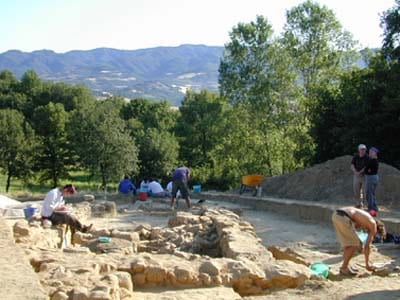The National Endowment for the Humanities (NEH) has awarded the Community College Humanities Association a grant of $201,415, which will allow the association to sponsor the 2012 NEH Summer Institute “The Legacy of Ancient Italy: The Etruscan and Early Roman City.”
P. Gregory Warden, University Distinguished Professor of Art History and associate dean for academic affairs in SMU’s Meadows School of the Arts, is the major professor and co-director of the Institute, which will be held June 5-25, 2012, in Italy.
The NEH grant makes it possible for 24 college and university teachers to participate in the three-week project in Italy exploring the legacy of Etruscan and early Roman culture. The goals of the institute are to help participants examine the current state of research in the study of these ancient cultures and develop strategies for taking that knowledge to contemporary classrooms.
Grant provides community college teachers with rare research opportunity
According to Warden, the grant also facilitates the dissemination of opportunities in the humanities to teachers in community colleges.
“People who teach in community colleges work so hard and get very little in return. And because they work so hard they get few research opportunities. This is a chance for them to engage in high-level research in a part of the world where they can get a lot out of it,” said Warden. He is co-director of the Mugello Valley Archaeological Project, an SMU-sponsored archaeological excavation at Poggio Colla, the site of an Etruscan settlement in Italy’s picturesque Mugello Valley.
The settlement on Poggio Colla, about 20 miles northeast of Florence, offers glimpses of Etruscan civilization, which flourished for hundreds of years during the first millennium B.C., before being assimilated by the Romans.
Summer Institute participants, whose selection in a nationally competitive process follows guidelines set by the NEH, will analyze how art, architecture and material culture can illuminate the social terrain of early Italy. Their research will be based on four major Institute themes: archaeology and urban identity in early Italy; Etruscan and Roman urbanization; economy, trade and cultural formation in the early Mediterranean; and the consequences of assimilation, appropriation and conquest of the Etruscans by the Romans.
Three-week program opens window to Etruscan dig, area’s culture
The choice of housing locations is designed to complement research and study. Participants will stay at locations in Florence; Rome; and Orvieto, a famous hill town in Italy known for the Crocifisso del Tufo Necropolis, an Etruscan archaeological site featuring burial chambers arranged along street-like grids.
Participants will also have access to local museums and archives, and excavated Etruscan sites, many of which are generally not open to the public. The three-week program will begin with an informal walking tour of Orvieto with Warden, and include seminars, visits to archaeological sites and the expertise of visiting scholars involved in cutting-edge research in the study of Etruscan civilization and ancient Italy.
Warden will be assisted by Institute co-director Carole Lester, professor of history and humanities at Richland College of the Dallas County Community College District; Institute associate Marsha Anderson, adjunct professor of arts and humanities at DCCCD; and Institute project manager David Berry, executive director of the Community College Humanities Association. — Victoria WInkelman
SMU is a nationally ranked private university in Dallas founded 100 years ago. Today, SMU enrolls nearly 11,000 students who benefit from the academic opportunities and international reach of seven degree-granting schools. For more information see www.smu.edu.
SMU has an uplink facility located on campus for live TV, radio, or online interviews. To speak with an SMU expert or book an SMU guest in the studio, call SMU News & Communications at 214-768-7650.



 SMU to help solve dangerous refugee water issues
SMU to help solve dangerous refugee water issues Anthropology researcher to study human-fire-climate interactions
Anthropology researcher to study human-fire-climate interactions